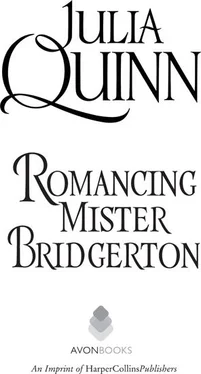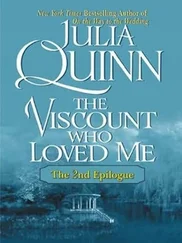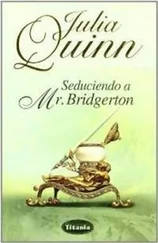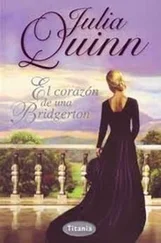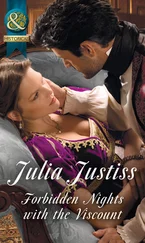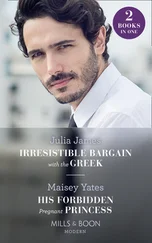Penelope scooted over to the right. “Of course,” she murmured, moving her book to the night table next to her.
“I’ve marked a few passages,” he said, holding forward his journal as he perched on the side of the bed. “If you’d like to read them, to”—he cleared his throat—“offer an opinion, that would be—” He coughed again. “That would be acceptable.”
Penelope looked at the journal in his hand, elegantly bound in crimson leather, then she looked up at him. His face was serious, and his eyes were somber, and although he was absolutely still—no twitching or fidgeting—she could tell he was nervous.
Nervous. Colin. It seemed the strangest thing imaginable.
“I’d be honored,” she said softly, gently tugging the book from his fingers. She noticed that a few pages were marked with ribbons, and with careful fingers, she opened to one of the selected spots.
14 March 1819
The Highlands are oddly brown .
“That was when I visited Francesca in Scotland,” he interrupted.
Penelope gave him a slightly indulgent smile, meant as a gentle scolding for his interruption.
“Sorry,” he mumbled.
One would think, at least one from England would think, that the hills and dales would be a rich emerald green. Scotland resides, after all, on the same isle, and by all accounts suffers from the same rain that plagues England .
I am told that these strange beige hills are called tablelands, and they are bleak and brown and desolate. And yet they stir the soul .
“That was when I was rather high up in elevation,” he explained. “When you’re lower, or near the lochs, it’s quite different.”
Penelope turned to him and gave him a look.
“Sorry,” he mumbled.
“Maybe you’d be more comfortable if you didn’t read over my shoulder?” she suggested.
He blinked in surprise.
“I would think you’ve already read all this before.” At his blank stare, she added, “So you don’t need to read it now.” She waited for a reaction and got none. “So you don’t need to hover over my shoulder,” she finally finished.
“Oh.” He inched away. “Sorry.”
Penelope eyed him dubiously. “Off the bed, Colin.”
Looking much chastened, Colin pushed himself off the bed and flopped into a chair in the far corner of the room, crossing his arms and tapping his foot in a mad dance of impatience.
Tap tap tap. Tappity tap tap tap .
“Colin!”
He looked up in honest surprise. “What?”
“Stop tapping your foot!”
He looked down as if his foot were a foreign object. “Was I tapping it?”
“Yes.”
“Oh.” He pulled his arms in more tightly against his chest. “Sorry.”
Penelope refocused her attention on the journal.
Tap tap .
Penelope jerked head up. “Colin!”
He planted his feet down firmly on the carpet. “I couldn’t help myself. Didn’t even realize I was doing it.” He uncrossed his arms, resting them on the upholstered side of the chair, but he didn’t look relaxed; the fingers on both of his hands were tense and arched.
She stared at him for several moments, waiting to see if he was truly going to be able to hold still.
“I won’t do it again,” he assured her. “I promise.”
She gave him one last assessing stare, then turned her attention back to the words in front of her.
As a people, the Scots despise the English, and many would say rightfully so. But individually, they are quite warm and friendly, eager to share a glass of whisky, a hot meal, or to offer a warm place to sleep. A group of Englishmen—or, in truth, any Englishman in any sort of uniform—will not find a warm welcome in a Scottish village. But should a lone Sassenach amble down their High Street—the local population will greet him with open arms and broad smiles .
Such was the case when I happened upon Inveraray, upon the banks of Loch Fyne. A neat, well-planned town that was designed by Robert Adam when the Duke of Argyll decided to move the entire village to accommodate his new castle, it sits on the edge of water, its whitewashed buildings in neat rows that meet at right angles (surely a strangely ordered existence for one such as I, brought up amid the crooked intersections of London) .
I was partaking of my evening meal at the George Hotel, enjoying a fine whisky instead of the usual ale one might drink at a similar establishment in England, when I realized that I had no idea how to get to my next destination, nor any clue how long it would take to get there. I approached the proprietor (one Mr. Clark), explained my intention to visit Blair Castle, and then could do nothing but blink in wonder and confusion as the rest of the inn’s occupants chimed in with advice. “Blair Castle?” Mr. Clark boomed. (He was a booming sort of man, not given to soft speech.) “Well, now, if ye’re wanting to go to Blair Castle, ye’ll certainly be wanting to head west toward Pitlochry and then north from there.”
This was met by a chorus of approval—and an equally loud echo of disapproval .
“Och, no!” yelled another (whose name I later learned was MacBogel). “He’ll be having to cross Loch Tay, and a greater recipe for disaster has never been tasted. Better to head north now, and then move west.”
“Aye,” chimed in a third, “but then he’ll be having Ben Nevis in his way. Are you saying a mountain is a lesser obstacle than a puny loch?”
“Are you calling Loch Tay puny? I’ll be telling you I was born on the shores of Loch Tay, and no one will be calling it puny in my presence.” (I have no idea who said this, or indeed, almost everything forthwith, but it was all said with great feeling and conviction.)
“He doesn’t need to go all the way to Ben Nevis. He can turn west at Glencoe.”
“Oh, ho, ho, and a bottle of whisky. There isn’t a decent road heading west from Glencoe. Are you trying to kill the poor lad?”
And so on and so forth. If the reader has noticed that I stopped writing who said what, it is because the din of voices was so overwhelming that it was impossible to tell anyone apart, and this continued for at least ten minutes until finally, old Angus Campbell, eighty years if he was a day, spoke, and out of respect, everyone quieted down .
“What he needs to do,” Angus wheezed, “is travel south to Kintyre, turn back north and cross the Firth of Lorne to Mull so that he can scoot out to Iona, sail up to Skye, cross over to the mainland to Ullapool, back down to Inverness, pay his respects at Culloden, and from there, he can proceed south to Blair Castle, stopping in Grampian if he chooses so he can see how a proper bottle of whisky is made.”
Absolute silence met this pronouncement. Finally, one brave man pointed out, “But that’ll take months.”
“And who’s saying it won’t?” old Campbell said, with the barest trace of belligerence. “The Sassenach is here to see Scotland. Are you telling me he can say he’s done that if all he’s done is taken a straight line from here to Perthshire?”
I found myself smiling, and made my decision on the spot. I would follow his exact route, and when I returned to London, I would know in my heart that I knew Scotland .
Colin watched Penelope as she read. Every now and then she would smile, and his heart would leap, and then suddenly he realized that her smile had become permanent, and her lips were puckering as if she were suppressing a laugh.
Colin realized he was smiling, too.
He’d been so surprised by her reaction the first time she’d read his writing; her response had been so passionate, and yet she’d been so analytical and precise when she spoke to him about it. It all made sense now, of course. She was a writer, too, probably a better one than he, and of all the things she understood in this world, she understood words.
Читать дальше
